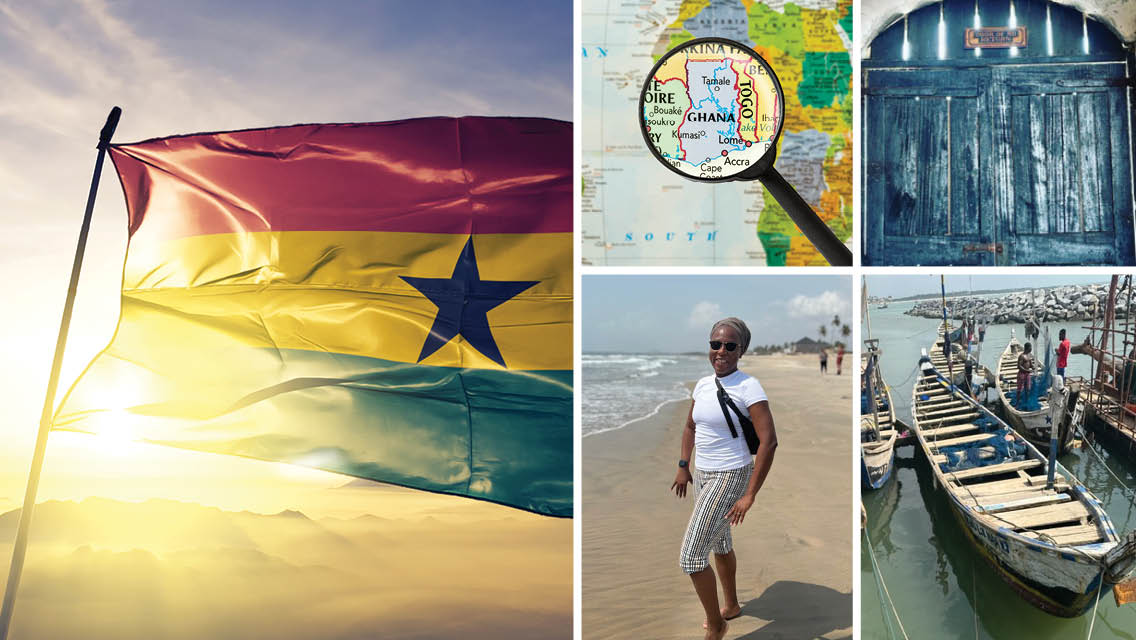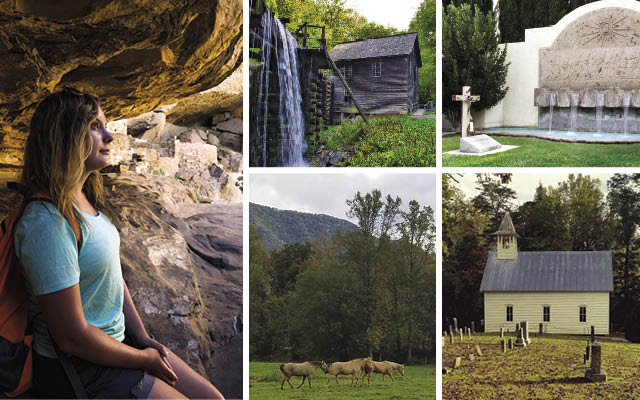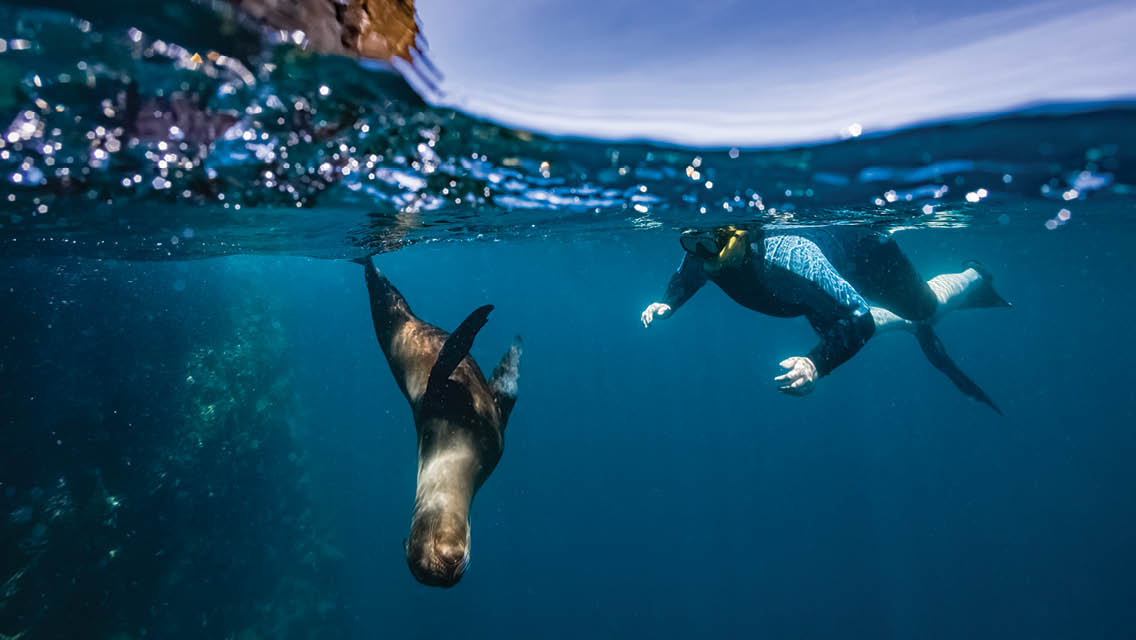Andrea Hanson expected her trip to Africa to be transformative. She didn’t expect her transformation to begin before she even left JFK Airport.
A graduate student in social work, Hanson was headed to Ghana last December for a research internship. She was the only Black person from her university on the trip, but virtually everyone else boarding the plane to Ghana that day was Black.
“To see an entire area at the airport filled with Black people — I had never experienced that before,” she recalls. Her initial reaction was one of confusion. “It just felt so foreign.”
Hanson is of West African descent, which she discovered via Ancestry.com’s DNA testing program. After a year of deep personal losses — her grandmother, mother, and brother had all recently died — this trip to Ghana had personal as well as academic meaning for her.
“In my family, your elders usher you into being an adult,” she explains. “I didn’t have my elders. But my family believes we walk with our ancestors — that they’re with you. So going to Ghana felt like not just a return for me but a return for them too.”
Arriving in Africa awakened in Hanson an overwhelming sense of connection to her roots — one she had craved but never experienced so intensely.
“I can’t explain the feeling of seeing all these people who looked like me,” she says, reflecting on the rare experience of not being in a minority. “I felt safe. I felt like I was just ‘Andrea,’ not ‘a Black woman.’”
A New Era in Ancestry Travel
Hanson’s reaction to arriving in Ghana is common for people of the African diaspora returning to Africa, says Gina Paige, PhD, cofounder and president of African Ancestry. For 20 years, the organization has used DNA testing to help people trace their family lineage not just to general regions but to present-day African countries and specific ethnic groups.
“Time and time again I hear people say, ‘I immediately felt like I was home,’” notes Paige. “The feelings and the experiences are visceral.”
African Americans have been returning to Africa for generations. In the 1950s, Henderson Travel Service, the first Black-owned international travel agency catering to African Americans, planned trips for clients who wanted to visit the continent. The agency relied on a chartered plane to take its first group to celebrate Ghana’s independence in 1957.
The experience of ancestry travel is different for African Americans than for Americans whose ancestors hail from, say, Europe.
“Black people are the original victims of identity theft. We don’t know our names, we don’t know our languages, we don’t know who our ancestors are,” explains Paige. “So, unlike an Irish person who knows that their family lived in this village and enjoyed this lifestyle, and who can look up records in the local archives, we can’t do that because of slavery.”
All the same, Paige believes traveling to Africa can be a profound experience.
“This is why what we do is so important and impactful: We tell people the exact county and tribe they came from,” she says. “Heritage travel is powerful for Black people because it fills a void. It tangibly connects us to lost traditions, cultural practices, values, and spirituality.”
Welcoming Their Children Home
In 2019, the government of Ghana launched an initiative to invite African diasporans home to Africa. Called the Year of Return, the program commemorated 400 years since the arrival of the first documented enslaved Africans in the United States.
“Ghana is considered the gateway to West Africa,” Paige explains, and for many people returning to Africa, the journey starts there, where so many of their ancestors’ journeys into slavery began.
At the height of the slave trade, Ghana was the “point of no return” for many stolen Africans; more than 40 “slave castles,” where African people were sold to traders and sent across the Atlantic, lined the country’s coastline. Ghana’s ongoing Beyond the Return campaign seeks to sustain the momentum of the 2019 program.
Hanson didn’t go to Ghana to participate in an official returning, but she nonetheless experienced a feeling of return with each place she visited and each person she met.
“The first time I went to the water, I got really emotional,” Hanson recalls. “I don’t know if people understand how meaningful it is to see the Atlantic Ocean from the other side, to recognize there’s someone within my lineage who never got a chance to look from this perspective again.”
Hanson says her visit has forever changed the way she looks at her ancestors, and at herself.
“I remember standing in one of the slave castles and feeling sad, and then angry — and then I just had this huge feeling of gratitude,” she recalls.
“I realized I’m not just some little Black girl who came from slavery. My story is vast and huge. I thought of my ancestors, and I realized you can’t survive something like this and not be made of magic.”
Hanson intends to return to Africa with her husband and children, and she’s considering doing DNA testing through Paige’s organization to learn more about her family’s lineage.
“There’s still so much unknown,” she says. “I don’t have names. I don’t have pictures. But I know this is where our story started.”
Have DNA Results, Will Travel
The type of DNA tests you might consider will depend on the level of genetic information you’re seeking to augment your ancestry travel experience, explains Kyle Betit, senior genealogist and travel-program operations manager for ProGenealogists, the professional services division of Ancestry.
“The AncestryDNA test is an autosomal DNA test, which means it’s looking at all of your chromosomes — all of your ancestors on your mother’s side and your father’s side of your family tree,” Betit explains.
Autosomal testing provides a snapshot of your ethnicity indicating regions of the world where your ancestors were living in the past 1,000 years. Most autosomal testing services offer a list of living relatives who have also tested with that service. AncestryDNA, for example, maintains a database of 22 million people, enabling you to find relatives and make connections.
“The other two kinds of tests that are commonly used are the Y-chromosome test, which looks at your father’s father’s father’s line, and the mitochondrial DNA test, which looks at your mother’s mother’s mother’s line,” Betit says.
Specifically, Y-chromosome testing for those assigned male at birth identifies the Y-chromosome haplogroup, the ancient group of people from whom your patrilineage descends.
Mitochondrial DNA tests trace your matrilineal ancestry through mitochondria, which are passed from mothers to children. African Ancestry uses these tests to identify the countries and tribes of their clients’ ancestors going back as far as 2,000 years.
Of course, you can enjoy a meaningful experience visiting the lands of your ancestors without taking a DNA test or doing genealogy research. But the more you know about your great-great-greats and beyond, the more you can discover about not just them but yourself.





This Post Has 0 Comments